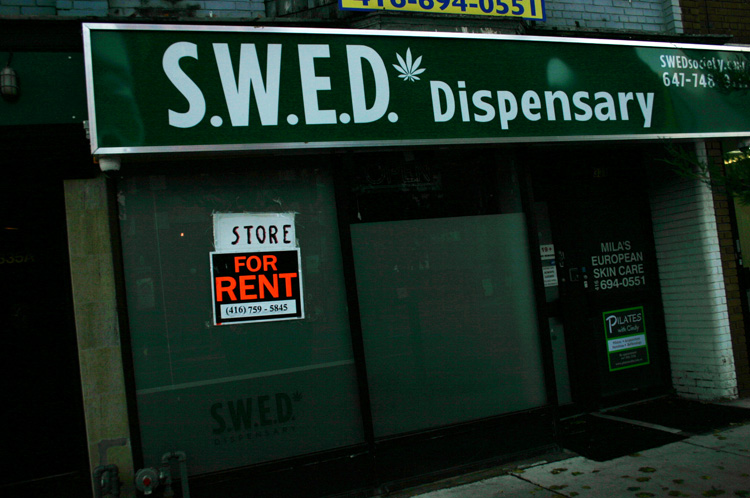A period of tolerance for Toronto marijuana dispensaries came to a sudden end in May, when police raided stores across the city. Ninety people were arrested and over 200 charges were laid. Dispensaries had their doors smashed down, employees were led away in handcuffs and vast quantities of marijuana was seized.

Arrests have continued off and on since then. Earlier this month, for example, police announced that a dozen people faced trafficking charges after a raid on a dispensary near the downtown core.
It’s surprising, then, that many of Toronto’s dispensaries — all of which operate illegally — haven’t been busted and closed down by police. As many as 60 are still in operation, estimates Jenna Valleriani, a University of Toronto PhD student who studies Canada’s grey market in medical marijuana. (There is no central list of dispensaries, at least in public, and they open and close frequently.)
“A lot of these places are being shut down and opening up again,” Valleriani says.
“How these places are continuing to open is that there is still a sense of selective enforcement.”
“We simply don’t have the resources to put all of our enforcement against marijuana storefronts,” says Toronto police spokesperson Meghan Gray. Enforcement targets dispensaries near schools and playgrounds, and ones that there have been complaints about, she says.
“Many of them have been left untouched, so they continue to thrive,” Lewin says. “There seems to be a very arbitrary application of the law.”
Protesters took to Toronto’s Old City Hall courthouse Monday to protest the 257 charges laid against marijuana dispensary workers after 43 storefronts were targeted in Toronto last month.

The charges, which include possession of proceeds obtained by crime, “would normally be very serious,” explains defence lawyer Paul Lewin.
“They do commonly attract jail. They’re not looking for jail — they’re just looking for guilty pleas with minimal consequences. But possession for the purpose of trafficking is really trafficking. You’re not getting into the States with that. It’s a very serious offence to have on your record.”

Get weekly money news
Dispensary workers, some as young as 19, may have found themselves in much deeper waters than they expected.
“I don’t know if these front-line workers are really getting the education that they need to realize how serious these kinds of charges are, and how long-lasting they can be,” Valleriani reflects.
READ: Why the government can’t charge more than $10 a gram for legal pot
“Typically, the people who are getting charged are front-line retail workers. They’re people receiving minimum wage. There are a lot of young people who just thought it was a really cool job, and now they have trafficking charges. They have to put thousands and thousands of dollars that they may not have into fighting these charges.”
The future job that working in a dispensary qualifies someone for is working in legal marijuana retail a few years from now.
Ironically, though, that a person may be barred precisely because they worked in a dispensary, and were unlucky enough to be working when the police arrived. With a trafficking charge, or a conviction after a plea deal that looked attractive at the time, that door may be closed.
“These people have lived and breathed cannabis for 20 or 30 years, in some cases,” Lewin says. “They have all this knowledge about the substance. We’re going to throw it all away, and instead have the government sell it, and instead we’ll have little pamphlets which the employees will be given – it doesn’t make any sense.”
READ: Canada will see 900,000 new pot smokers under legalization, poll implies
In the meantime, the hundreds of dispensary-related charges don’t seem to be much of a priority for the justice system, Lewin says. Police and Crowns want to focus drug enforcement on heroin, opioids, crack and dangerous new synthetic drugs.
READ: How will legal pot be sold? Three things that might happen, and one that won’t
“The prosecutors aren’t pursuing them very vigorously,” Lewin says. “All the signs are that they’re not very interested in this, and that they’ve been saddled with this giant mess. It’s the same with the police.”
“We’re looking at 200 or 300 people charged. This thing has gone on all summer and into the fall. It’s an incredible load for the criminal justice system, which is already overburdened.”
(Gray disputed the idea that marijuana is a lower priority for enforcement than some other drugs.)
The ‘Prince of Pot,’ Marc Emery, has reopened his cannabis dispensary, Cannabis Culture, in Toronto the day after Toronto Police shut it down in a raid.







Comments
Want to discuss? Please read our Commenting Policy first.